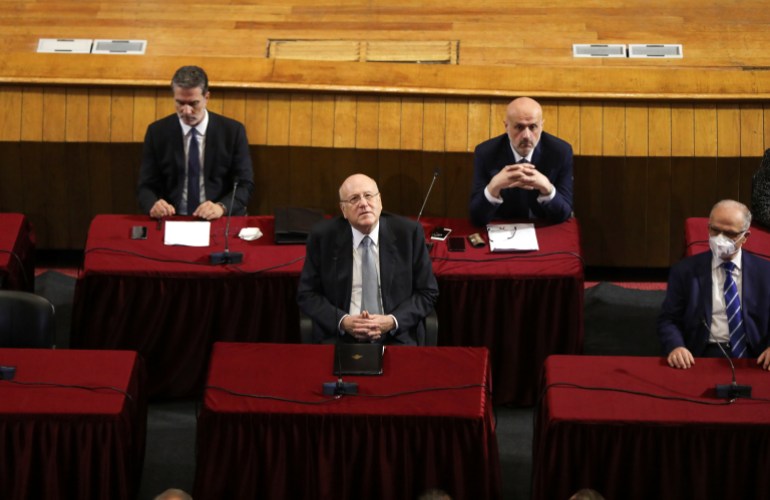Lebanon’s parliament is meeting to elect a president of the republic, more than two years after the last president’s term ended.
As the debate grew over who will take the top office, Lebanese political parties and influential figures have been in talks with foreign officials.
Here’s everything you need to know about Lebanon’s presidential vote on Thursday:
Two years? Why so long between presidents?
Parliament hasn’t managed to find a consensus candidate.
Political parties prioritize their interests over the good of Lebanon, which would be served by a stable government, despite the numerous crises Lebanon has recently experienced.
At the end of 2023, all attempts to elect a president were thwarted as a result of Israel’s war against Lebanon.
During the ceasefire negotiations, the issue of selecting a president became an important topic of discussion.
Does parliament elect the president?
Yes.
Not the Lebanese electorate, the parliament elects the president through candidates who are active in political parties and members of parliament (MPs).
Lebanon has 128 MPs, and a candidate needs a majority with at least 86 votes.
Lebanese presidents have been consensus candidates who haven’t been a part of political movements since the end of the civil war in 1990.
Michel Aoun, who served as president and was the Free Patriotic Movement’s leader, is one of the few exceptions.
Who will win?
The Lebanese president has to be a Maronite Christian, according to Lebanon’s political representation system.
General Joseph Aoun, the head of the Lebanese army, appears to be the most likely candidate to win the 86-vote threshold.
His name has received support from the international community and has been in conversation for more than a year.
Aoun wouldn’t be the first army chief to become president.
Emile Lahoud (president from 1998 to 2007), Michel Sleiman (2008 to 2014), and Michel Aoun (2016 to 2022) were also chiefs before becoming president, with Lahoud and Sleiman becoming president directly after leading the Lebanese Armed Forces.
Aoun is no relation to former President Michel Aoun, it’s just a common name in Lebanon.

Is Aoun popular?
Aoun has a lot of support and is relatively uncontroversial.
This includes from Walid Jumblatt’s Progressive Socialist Party, the National Moderation bloc – which comprises ex-members of former PM Saad Hariri’s Future Movement – Sleiman Frangieh’s Marada Movement, the Kataeb (Phalangist) Party and some reform MPs who were elected in 2022, riding the wave of the 2019 revolution.
The right-wing Christian Lebanese Forces party hasn’t committed but said it may support Aoun, while he is also thought to be the United States’s favoured candidate.
Is there a notable challenger?
There was one, Sleiman Frangieh.
Hezbollah, a Shia political party led by Speaker of the parliament, and Amal, a government organization, supported him.
A small Christian party called Marada, which has a stronghold in the northern Zgharta region, is led by Frangieh.
Frangieh’s chances took a hit after Hezbollah was weakened by Israel’s war on Lebanon and Syria’s Assad regime – a close ally of the Frangiehs – fell.
Frangieh withdrew his candidacy and supported Joseph Aoun the day before the vote.

Are these the only candidates?
No. The ring contains a few more names than just that.
In 2023, Jihad Azour, a former finance minister and IMF employee, was well-liked by Christian organizations like the Lebanese Forces and the Free Patriotic Movement.
His support, however, appears to have declined as Aoun is being considered by the Lebanese Forces.
There’s also Elias Baysari, the interim head of Lebanon’s General Security directorate.
He was perceived as a potential front-runner, but he lacks open support, and an MP said Baysari may eventually withdraw from the race in his own name.
Other contenders are businessman and MP Neemat Frem, who has said he might back Aoun himself, and the Free Patriotic Movement’s Gebran Bassil, who has little support outside his party.
Ziad Baroud, a former interior minister, is occasionally mentioned as a potential consensus candidate.
While serving as minister, Baroud was well-known and well-respected in civil society, but he lacks much support from the traditional players.

Once Lebanon has a president, what happens next?
Of course, electing a president won’t solve Lebanon’s myriad crises.
However, they can elect a prime minister once the president is in place, which will then create a government that can replace the caretaker administration.
Lebanon needs more extensive systemic reforms, according to international lenders like the World Bank, which can provide a cash injection.
A new administration might be able to accomplish that.
Why are foreign powers involved in choosing Lebanon’s president?
Many Lebanese political parties seek foreign support or funding to bolster domestic influence.

Leave a Reply